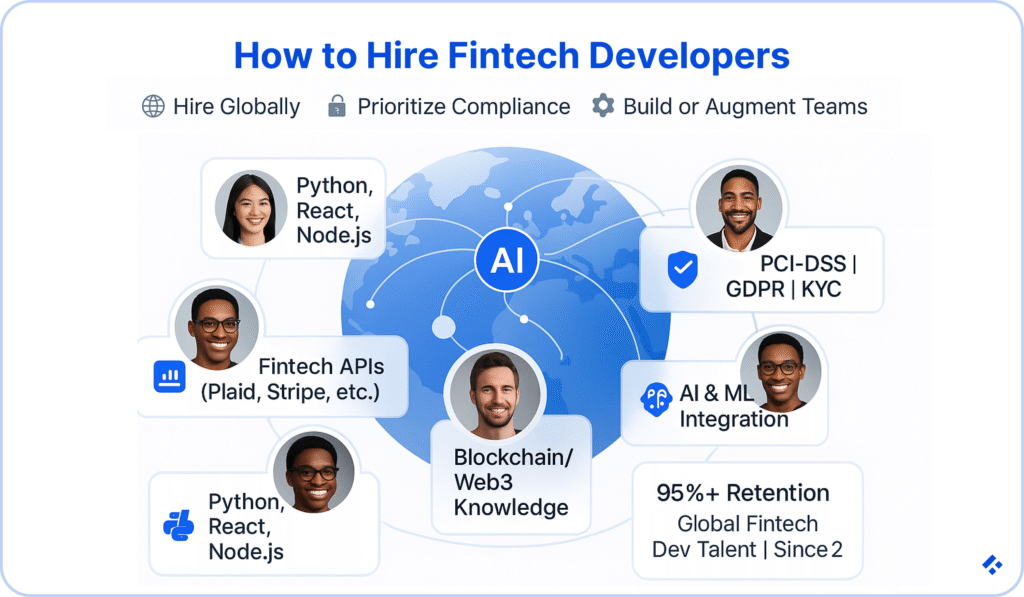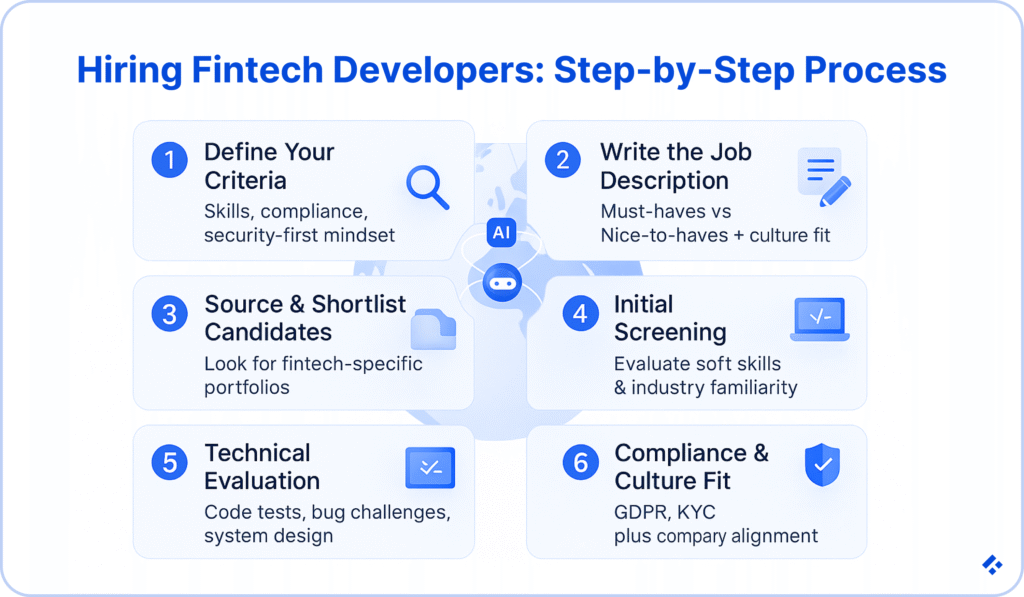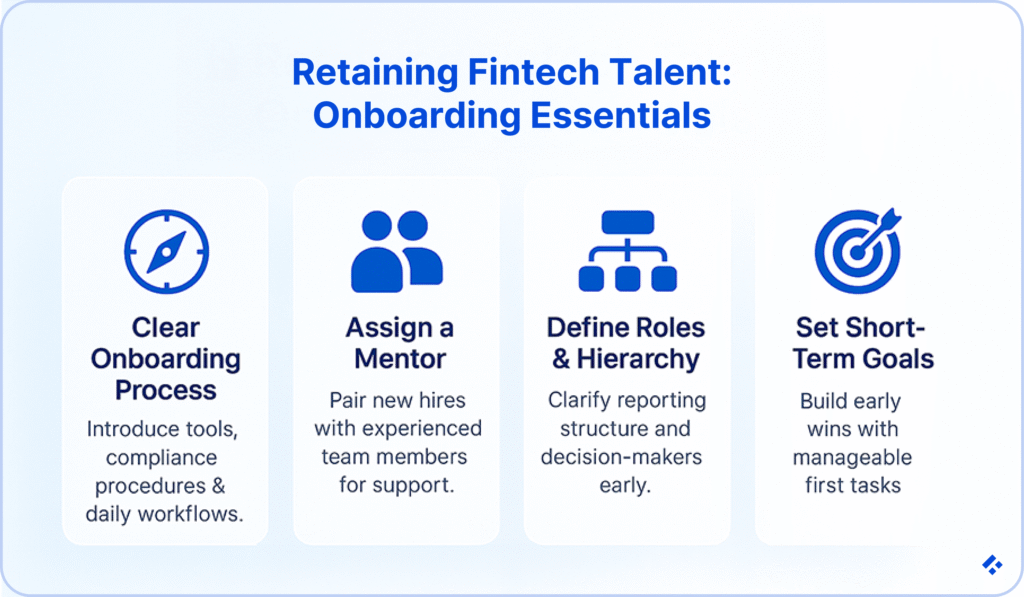There are many opportunities in the fintech market, with more than 12,000 financial technology companies in North America in 2024. Changes in AI, machine learning, blockchain, cybersecurity, and user requirements have caused massive changes in the fintech industry, which you could leverage if you had the right software development team.
Let’s look at how to hire fintech developers. You’ll want to find developers who not only have incredible technical abilities but also fintech expertise, so that you can rest easy knowing their development is compliant with the many regulatory requirements and security nuances of the industry.
Since we were founded in 2019, we have connected clients with developers from all over the world. By focusing on putting together a fintech development team with specialized knowledge and experience, we have been able to maintain a developer retention rate of over 95%.
If you want to find the right fintech programmers for you, or learn more about whether it’s best to augment your in-house team or whether you could benefit from a hiring model like outsourcing, you are in the right place.

Why Hiring the Right Fintech Developers is Critical in 2026
You can’t just hire anyone to create your fintech solutions. You need to hire fintech software developers. But why is it so important to make this distinction in your hiring process?
The survival of many fintech companies hinges on the fact that their users trust them. These trust requirements are a natural byproduct of any industry dealing with money and sensitive data. Then there’s the fact that there are global regulations that you need to comply with to avoid fines and other consequences, which might sink your company, especially as a startup.
You also need to consider the fact that the financial software development sector is always changing, and that you need to stay ahead of the curve to make sure you aren’t wasting your time.
All of this means that you need a specialist who is fully educated on the world of fintech software development. These developers will have experience preventing security vulnerabilities, compliance issues, and any resulting revenue issues.
When you hire a fintech developer, they will also have extensive knowledge of the specific programming languages, frameworks, and any other tools needed. They will spend less time learning on the job, letting you get your products out there faster.
Defining Your Hiring Needs
Before you can start the process to hire top fintech developers, you first need to define your hiring needs to make sure they have all the technical and coding skills that you require.
One of the biggest mistakes that we have seen in the many years we’ve been outsourcing in the fintech sector is that our clients forget to consider their soft skills, like the ability to collaborate effectively, problem-solving skills, and their company culture alignment.
These factors are just as important as any other factors in determining the right candidate for you, so make sure to consider them to make informed decisions.
Identify Your Product and Business Goals
To identify your hiring needs, start by understanding the type of product that you are building. When it comes to fintech products, this could be a payment gateway, digital bank, crypto wallet, investment platform, or a variety of other apps that deal with money or facilitate transactions in some way.
You also need to think about your long-term business goals and decide which regulations might apply to you in your initial markets, as well as ones you will expand to in the future.
GDPR, PCI-DSS, or PSD2 are some common examples that play some role in the fintech landscape.
Understanding all of these factors will give you a clear indication of the key skills you will have to look out for when hiring experienced fintech developers.
Assess Your Required Skill Set
Once your goals are set out, you can break them down into smaller and smaller steps.
For example, instead of simply acknowledging that you want to build an investment platform, you can take into account that you will need to build the front end, back end, test, etc.
Based on these steps, you’ll identify the technical and soft skills your potential developers need.
Some common programming languages used in fintech applications include Python, Java, C++, and JavaScript. Depending on your fintech goals, your software engineers will also need to know how to use and implement certain technologies like APIs (Plaid, Yodlee), payment gateways (Stripe, PayPal), and blockchain integrations.
As already mentioned, don’t forget soft skills, so that you build a team capable of driving innovation, and avoid unnecessary roadblocks.
Choosing the Right Hiring Model
Hiring is not what it used to be. Thanks to advances in remote work, you can now hire fintech candidates from all over the world using a variety of hiring models. Let’s take a look at which options might be best for you.
In-House Developers
When you hire developers for a full-time position to build an in-house team, you are setting yourself up to scale with relative ease in the long term.
Through trial and error, your team could closely align with your values and build an intrinsic knowledge of your company and its requirements.
Another advantage is that you have full control over your team of fintech professionals and have the control to alter the project at any time.
However, when you hire fintech app developers in the traditional way, you commit to higher costs when trying to attract and retain top talent. This includes costs like full-time salaries, even when you have no work for them to do, and benefits.
Freelance Fintech Developers
If you expect your need for highly specialized abilities to be short-term, hiring freelance developers may be an option. In fintech projects, these short-term roles don’t really exist outside of things like security audits, but it’s still important to keep this option in mind.
The great thing about hiring freelancers is that you can take advantage of flexible work arrangements and a very quick hiring process, thanks to the variety of freelance platforms out there.
Since you aren’t permanently employing these developers, you may struggle with inconsistent availability, though. The impermanent nature of their work could also affect how well they integrate with your existing team.
Outsourced Fintech Development
What if you are new to the fintech scene? You need developers, but don’t understand enough about the protocols of the industry (tech or finance) to be able to manage a team.
This is where outsourcing becomes a lifesaver. You entrust your project to a third party with some of the best fintech developers in the world available to them. You tell them what you want, they give you a price, and then they handle everything for you.
Outsourcing is great if you have something you need done quickly, but it does mean that you have less control.
Staff Augmentation
If you already have a team but need specialized financial software developers, staff augmentation is a good option. It differs from in-house hiring as you do not permanently hire new employees. Instead, you collaborate with a firm that provides the right people on a temporary basis.
These companies take care of all the fintech hiring risks, vetting developers on their own and allowing you to swap them out if they aren’t a good fit. You also don’t have to provide benefits or find work for them when your project is completed.
However, you still need to manage the new fintech developers that have been added to your team, which can be daunting for some.
Hybrid Models
If one model doesn’t fit you perfectly, consider a hybrid model where you work with a mixture of everything we have mentioned already.
You could have a basic in-house team, while outsourcing some components of your app to speed up the overall process and augmenting your staff only when you have sudden, increased needs.
We’ve helped many companies with any one of these models, and a mixture of them all. Some of our developers are almost permanently with a certain company, while others we help when they suddenly need a larger workforce to meet investor or user requirements on a tight deadline.
When you work with Trio, you will get a custom solution to ensure your software development services are delivered in the most cost-effective way.
Hiring Process Step-by-Step
What if you want to hire the best fintech developers out there on your own? There are a couple of steps you can take and a few nuances you need to take note of to increase your chances of success.
Step 1: Define Your Hiring Criteria
As we’ve already mentioned, before you can start the hiring process, you need to understand what skills your developers must have. This involves knowing what you will need in terms of an end product and considering the technical skills required.
Don’t forget to consider things like industry experience, familiarity with compliance standards, and how developers will need to use a security-first development approach.
If you already have a collection of employees, think about your company culture. And, even if you are just starting out as a small fintech startup, keep your company mission in mind.
Step 2: Write a Job Description and Post Job Listings
Once you have a clear understanding of your requirements for potential fintech developers, you need to write a compelling job listing and post it.
When you write a job description, make sure you include every technical and soft skill already decided on, and highlight your company’s mission.
You could split your required skillset into ‘must-have’ and ‘nice-to-have’, and include a little more information on the kind of project you are hiring for, so that developers develop a good understanding of whether or not they might be suitable for the position.
Step 3: Source and Shortlist Candidates
Once you start getting replies, you should source and shortlist your candidates.
There are many potential sites to hire fintech developers, which we will discuss further below; however, it is probably a good idea to use more than one, where possible. Regardless of how you choose to find fintech developers for your startup, you will need to shortlist them.
Resumes are the place to start, as they will give you a good idea of their formal employment history and the kind of companies the developers have worked with before, as well as show you a clear career progression. However, a portfolio holds more power in the world of software development.
When looking at a portfolio, you’ll want to make sure that they have worked on projects similar to your own before and have shown how they have considered regulatory compliance and security.
You could even send through some preliminary screening questions that will give you a better idea of their technical and non-technical abilities.
Step 4: Conduct Initial Screening
Once you have a shortlist of candidates, you can schedule an interview with them. Make sure that you keep an eye out for their communication skills, their familiarity with the financial industry, and everything that they are doing to keep learning and stay up-to-date in the industry.
Talk about your company culture and go over their past experience in more detail, and whether or not they would be suitable for the required position. If you are hiring for an in-house position, consider their long-term potential. You could always train them in a few missing skills (even soft skills) if you believe they may be worth the investment.
Step 5: Technical Evaluation
You can then move on to assessing a candidate’s technical skills through live coding challenges, system design interviews, and problem-solving scenarios.
Make sure that you focus on technical skills that are relevant in the fintech space. For example, you may want to have them deal with a bug in a payment gateway.
If you are unsure of how to do this technical evaluation on your own, there are a bunch of companies out there who can help you with pre-designed tests, but these might not be as targeted as a test you design on your own.
Step 6: Compliance and Cultural Fit Evaluation
Discuss financial regulations with your developer, like GDPR or KYC. Make sure that you go over their understanding of those that will affect you specifically.
You can ask about practical experience here or issues that they have dealt with before. How much knowledge you require will depend on your existing team. If you find potential developers familiar with all but one regulation, and you know your team could help them out with that one, you don’t necessarily have to write them off.
Potentially, you could also discuss a short probation period to see how the developer adapts and how they practically fit into your company culture before you make your final decision.
Step 7: Make the Offer and Close the Hire
Once you have decided to go with a developer, you can start discussing compensation. Remember that fair compensation keeps your developers happy and makes them more likely to stay within the company long-term.
Market research will never fail you. However, if you are unsure, you can consult with a hiring firm like Trio.
Remember that the different hiring models will affect the way a developer is paid.

Where to Find the Best Fintech Software Developers
There are many places you can find fintech developers, but the most common places include:
- Hiring Platforms
- Freelance Platforms
- Development Companies
Hiring platforms like LinkedIn are great if you have time to look through a bunch of portfolios, but you’ll probably get a very wide variety of applications with varied quality. The same can be said for freelance platforms like Upwork.
If you want to guarantee that you are getting only experienced developers, you could go through a slightly more exclusive platform like Toptal, but your best bet is going to be a development company like Trio.
We meet with you to discuss your development requirements and hand-pick a couple of resumes for you, with a guarantee that all of the developers have the experience you require. Onboarding is also taken care of on our part so that you can save your resources for other HR tasks.
Cost to Hire Fintech Developers
Depending on the hiring model you choose, you may pay hourly or by the project. But there are many other factors that also affect the cost of your fintech hire:
- Skills and Experience
- Region
- Project Complexity
Someone just dipping their toes into the fintech industry won’t charge as much as a seasoned expert with many successful projects under their belt. However, the latter developer may also work faster, and you’ll be able to get expert tips on how to improve your project. This may make your expert more expensive upfront, but may be more cost-effective in the long run.
Region is also a big factor. The cost of living in places like Latin America is a lot less than in countries like the US or Germany, so it is only natural that these developers charge less. The reduced cost does not necessarily reflect a lower quality of work, as some countries with lower costs of living have incredible STEM education systems. Brazil is one such example.
Finally, and quite obviously, the complexity of your project will play a role in the cost. A small app with a couple of features won’t take as long to code as something with a bunch of features that all need to work together. You won’t need as many skills either.
Retaining Fintech Talent After Hiring
If you manage to hire a fintech developer successfully, how do you keep them? At Trio, you don’t have to worry about this too much. We’ll help you every step of the way, but if you are hiring on your own, you may want to consider the packages you offer as well as your onboarding process.
Onboarding Best Practices
Don’t hire your developer and then abandon them. Make sure that you bring them up to speed on the internal tools you are using, your compliance procedures, and anything they will need to focus on.
You can also cement your company’s hierarchy by making it clear who they are working under, so they know who to report to and who to ask for help.
It is common practice to assign a new hire a mentor of some sort. This can speed up their integration into your team and help them feel supported.

How to Offer Competitive Packages
We’ve already discussed how you need to consider fair compensation, and that market research is a great tool for this.
Your compensation will likely be made up of several factors, including base pay, equity options (especially if you are a startup), and benefits like healthcare and retirement plan matches.
Another factor that companies often forget about is continued education. If you provide the budget and opportunity to give your developers certificates that may prove valuable later, they may see more benefit in staying.
Finally, think about the flexibility that you offer. Do you allow hybrid or remote setups? Do your developers have to work set hours?
Although these factors may not be compensation-related, they increase developer well-being and long-term satisfaction.
If you are interested in hiring an experienced fintech developer, we can help you with that. We provide our clients with access to the top 1% of developer talent from nearshore and offshore countries.
To get started, reach out to schedule a free consultation so we can get started with your custom solution.